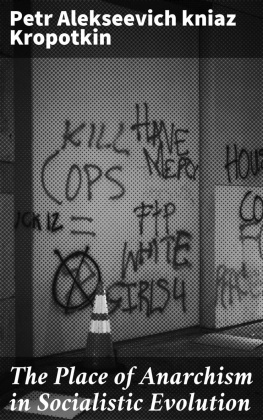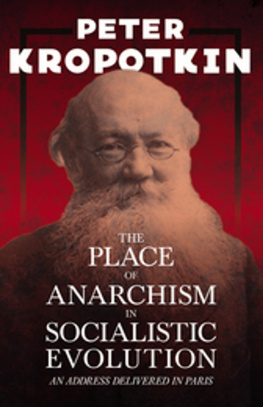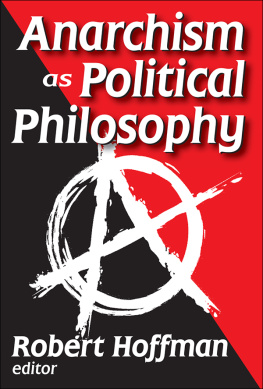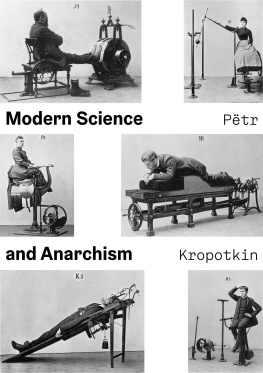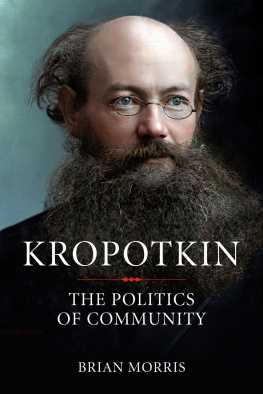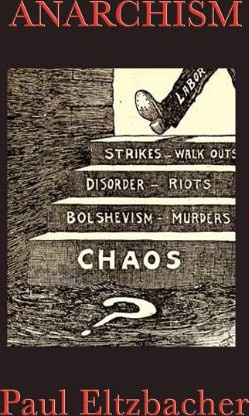Pëtr Kropotkin - Anarchism: its philosophy and ideal
Here you can read online Pëtr Kropotkin - Anarchism: its philosophy and ideal full text of the book (entire story) in english for free. Download pdf and epub, get meaning, cover and reviews about this ebook. publisher: Text::Muse, genre: Politics. Description of the work, (preface) as well as reviews are available. Best literature library LitArk.com created for fans of good reading and offers a wide selection of genres:
Romance novel
Science fiction
Adventure
Detective
Science
History
Home and family
Prose
Art
Politics
Computer
Non-fiction
Religion
Business
Children
Humor
Choose a favorite category and find really read worthwhile books. Enjoy immersion in the world of imagination, feel the emotions of the characters or learn something new for yourself, make an fascinating discovery.

- Book:Anarchism: its philosophy and ideal
- Author:
- Publisher:Text::Muse
- Genre:
- Rating:5 / 5
- Favourites:Add to favourites
- Your mark:
- 100
- 1
- 2
- 3
- 4
- 5
Anarchism: its philosophy and ideal: summary, description and annotation
We offer to read an annotation, description, summary or preface (depends on what the author of the book "Anarchism: its philosophy and ideal" wrote himself). If you haven't found the necessary information about the book — write in the comments, we will try to find it.
Anarchism: its philosophy and ideal — read online for free the complete book (whole text) full work
Below is the text of the book, divided by pages. System saving the place of the last page read, allows you to conveniently read the book "Anarchism: its philosophy and ideal" online for free, without having to search again every time where you left off. Put a bookmark, and you can go to the page where you finished reading at any time.
Font size:
Interval:
Bookmark:
Translated from the German by Harry Lyman Koopman. First published in San Francisco by Free Society, 1898
Retrieved on February 25th, 2009 from dwardmac.pitzer.edu
Ever reviled, accursed, ner understood,
Thou art the grisly terror of our age.
Wreck of all order, cry the multitude,
Art thou, and war and murders endless rage.
O, let them cry. To them that neer have striven,
The truth that lies behind a word to find,
To them the words right meaning was not given.
They shall continue blind among the blind.
But thou, O word, so clear, so strong, so pure,
That sayest all which I for goal have taken.
I give thee to the future! -Thine secure
When each at last unto himself shall waken.
Comes it in sunshine? In the tempests thrill?
I cannot tell......but it the earth shall see!
I am an Anarchist! Wherefore I will
Not rule, and also ruled I will not be!
John Henry Mackay.
* * *
It is not without a certain hesitation that I have decided to take the philosophy and ideal of Anarchy as the subject of this lecture.
Those who are persuaded that Anarchy is a collection of visions relating to the future, and an unconscious striving toward the destruction of all present civilization, are still very numerous; and to clear the ground of such prejudices of our education as maintain this view we should have, perhaps, to enter into many details which it would be difficult to embody in a single lecture. Did not the Parisian press, only two or three years ago, maintain that the whole philosophy of Anarchy consisted in destruction, and that its only argument was violence?
Nevertheless Anarchists have been spoken of so much lately, that part of the public has at last taken to reading and discussing our doctrines. Sometimes men have even given themselves trouble to reflect, and at the present moment we have at least gained a point: it is willingly admitted that Anarchists have an ideal. Their ideal is even found too beautiful, too lofty for a society not composed of superior beings.
But is it not pretentious on my part to speak of a philosophy, when, according to our critics, our ideas are but dim visions of a distant future? Can Anarchy pretend to possess a philosophy, when it is denied that Socialism has one?
This is what I am about to answer with all possible precision and clearness, only asking you to excuse me beforehand if I repeat an example or two which I have already given at a London lecture, and which seem to be best fitted to explain what is meant by the philosophy of Anarchism.
* * *
You will not bear me any ill-will if I begin by taking a few elementary illustrations borrowed from natural sciences. Not for the purpose of deducing our social ideas from them far from it; but simply the better to set off certain relations, which are easier grasped in phenomena verified by the exact sciences than in examples only taken from the complex facts of human societies.
Well, then, what especially strikes us at present in exact sciences, is the profound modification which they are undergoing now, in the whole of their conceptions and interpretations of the facts of the universe.
There was a time, you know, when man imagined the earth placed in the center of the universe. Sun, moon, planets and stars seemed to roll round our globe; and this globe, inhabited by man, represented for him the center of creation. He himself the superior being on his planet was the elected of his Creator. The sun, the moon, the stars were but made for him; toward him was directed all the attention of a God, who watched the least of his actions, arrested the suns course for him, wafted in the clouds, launching his showers or his thunder-bolts on fields and cities, to recompense the virtue or punish the crimes of mankind. For thousands of years man thus conceived the universe.
You know also what an immense change was produced in the sixteenth century in all conceptions of the civilized part of mankind, when it was demonstrated that, far from being the centre of the universe, the earth was only a grain of sand in the solar system a ball, much smaller even than the other planets; that the sun itself though immense in comparison to our little earth, was but a star among many other countless stars which we see shining in the skies and swarming in the milky-way. How small man appeared in comparison to this immensity without limits, how ridiculous his pretensions! All the philosophy of that epoch, all social and religious conceptions, felt the effects of this transformation in cosmogony. Natural science, whose present development we are so proud of, only dates from that time.
But a change, much more profound, and with far wider reaching results, is being effected at the present time in the whole of the sciences, and Anarchy, you will see, is but one of the many manifestations of this evolution.
Take any work on astronomy of the last century, or the beginning of ours. You will no longer find in it, it goes without saying, our tiny planet placed in the center of the universe. But you will meet at every step the idea of a central luminary the sun which by its powerful attraction governs our planetary world. From this central body radiates a force guiding the course of the planets, and maintaining the harmony of the system. Issued from a central agglomeration, planets have, so to say, budded from it; they owe their birth to this agglomeration; they owe everything to the radiant star that represents it still: the rhythm of their movements, their orbits set at wisely regulated distances, the life that animates them and adorns their surfaces. And when any perturbation disturbs their course and makes them deviate from their orbits, the central body re-establishes order in the system; it assures and perpetuates its existence.
This conception, however, is also disappearing as the other one did. After having fixed all their attention on the sun and the large planets, astronomers are beginning to study now the infinitely small ones that people the universe. And they discover that the interplanetary and interstellar spaces are peopled and crossed in all imaginable directions by little swarms of matter, invisible, infinitely small when taken separately, but all-powerful in their numbers. Among those masses, some, like the bolide that fell in Spain some time ago, are still rather big; others weigh but a few ounces or grains, while around them is wafted dust, almost microscopic, filling up the spaces.
It is to this dust, to these infinitely tiny bodies that dash through space in all directions with giddy swiftness, that clash with one another, agglomerate, disintegrate, everywhere and always, it is to them that today astronomers look for an explanation of the origin of our solar system, the movements that animate its parts, and the harmony of their whole. Yet another step, and soon universal gravitation itself will be but the result of all the disordered and incoherent movements of these infinitely small bodies of oscillations of atoms that manifest themselves in all possible directions. Thus the center, the origin of force, formerly transfered from the earth to the sun, now turns out to be scattered and disseminated: it is everywhere and nowhere. With the astronomer, we perceive that solar systems are the work of infinitely small bodies; that the power which was supposed to govern the system is itself but the result of the collisions among those infinitely tiny clusters of matter, that the harmony of stellar systems is harmony only because it is an adaptation, a resultant of all these numberless movements uniting, completing, equilibrating one another.
The whole aspect of the universe changes with this new conception. The idea of force governing the world, of pre-established law, preconceived harmony, disappears to make room for the harmony that Fourier had caught a glimpse of: the one which results from the disorderly and incoherent movements of numberless hosts of matter, each of which goes its own way and all of which hold each other in equilibrium.
Font size:
Interval:
Bookmark:
Similar books «Anarchism: its philosophy and ideal»
Look at similar books to Anarchism: its philosophy and ideal. We have selected literature similar in name and meaning in the hope of providing readers with more options to find new, interesting, not yet read works.
Discussion, reviews of the book Anarchism: its philosophy and ideal and just readers' own opinions. Leave your comments, write what you think about the work, its meaning or the main characters. Specify what exactly you liked and what you didn't like, and why you think so.

